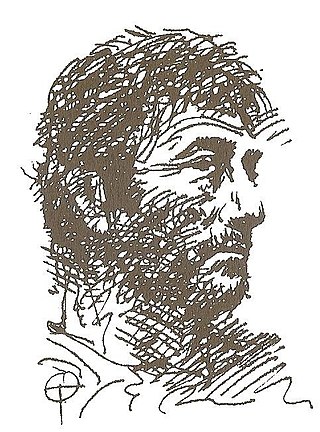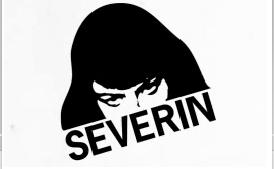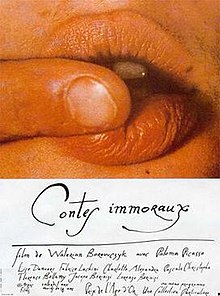
Stephen and Timothy Quay are American identical twin brothers and stop-motion animators who are better known as the Brothers Quay or Quay Brothers. They received the 1998 Drama Desk Award for Outstanding Set Design for their work on the play The Chairs.

Walerian Borowczyk was a Polish film director described by film critics as a "genius who also happened to be a pornographer". He directed 40 films between 1946 and 1988. Borowczyk settled in Paris in 1959. As a film director, he worked mainly in France.

André Pieyre de Mandiargues was a French writer born in Paris. He became an associate of the Surrealists and married the Italian painter Bona Tibertelli de Pisis. He was a particularly close friend of the painter Leonor Fini.

Lesbian vampirism is a trope in early gothic horror and 20th century exploitation film. The archetype of a lesbian vampire used the fantasy genre to circumvent the heavy censorship of lesbian characters in the realm of social realism.

Arrow Films is a British independent film distributor and restorer specialising in world cinema, arthouse, horror and classic films. As Arrow Video, it sells Ultra HD Blu-rays, Blu-rays and DVDs online; it also operates its own subscription video on-demand service, Arrow Player. Since 2017, Arrow have had a dedicated podcast hosted by film-makers Sam Ashurst and Dan Martin. Arrow Video is considered a boutique Blu-ray label.

Bathory is a 2008 historical drama written and directed by Juraj Jakubisko. Filming began in December 2005, and the film was released in July 2008. It was Jakubisko's first English-language film and an international co-production between the cinemas of Slovakia, the Czech Republic, Hungary, and the United Kingdom.

Ljubomir "Ljuba" Popović was a Serbian surrealist painter. He is renowned for his many erotic and unconventionally juxtaposed subject matters.

Fando y Lis is a 1968 Mexican surrealist film directed by Alejandro Jodorowsky in his feature length directorial debut. It is an adaptation of a 1962 play of the same name by Fernando Arrabal, who was working with Jodorowsky on performance art at the time. The film was shot in high-contrast black-and-white on the weekends with a small budget and was first shown at the Acapulco Film Festival in 1968. Fando y Lis stars Sergio Kleiner and Diana Mariscal as the titular pair who embark on a surreal quest in search of Tar, a mythical heaven-like place.

Emmanuelle 5 is a 1987 English-language French film directed by Walerian Borowczyk. It is a sequel to 1984's Emmanuelle 4 and the fifth installment in the film series of the same name. It was followed by a sequel, Emmanuelle 6, released in 1988.
Berneval-le-Grand is a former commune in the Seine-Maritime department in the Normandy region in northern France. On 1 January 2016, it was merged into the new commune of Petit-Caux.

The Beast is a 1975 French erotic horror film written, edited, and directed by Walerian Borowczyk. Although sometimes compared with Beauty and the Beast, there are no parallels in the plot except that it features the relationship between a beast (monster) and a woman. The film was noted for its explicit sexual content, including teratophilia, upon its initial release. It has become a cult film.
In the film industry, unsimulated sex is the presentation of sex scenes in which actors genuinely perform the depicted sex acts, rather than simulating them. Although it is ubiquitous in films intended as pornographic, it is very uncommon in other films. At one time in the United States, such scenes were restricted by law and self-imposed industry standards such as the Motion Picture Production Code. Films showing explicit sexual activity were confined to privately distributed underground films, such as stag films or "porn loops". In the 1960s, social attitudes about sex began to shift, and sexually explicit films were decriminalized in many countries.

Severin Films is an American independent film production and distribution company known for restoring and releasing cult films on DVD and Blu-ray. It is considered a boutique Blu-ray and DVD label.

Immoral Women is a 1979 French erotic drama film directed by Walerian Borowczyk, written by Borowczyk and André Pieyre de Mandiargues and starring Jean-Claude Dreyfus, Marina Pierro and Françoise Quéré.

Housekeeping is a 1987 American comedy-drama film written and directed by Bill Forsyth, starring Christine Lahti, Sara Walker, and Andrea Burchill. Based on Marilynne Robinson's 1980 novel Housekeeping, it is about two young sisters growing up in Idaho in the 1950s. After being abandoned by their mother and raised by elderly relatives, the sisters are looked after by their eccentric aunt whose unconventional and unpredictable ways affect their lives. It was filmed on location in Alberta and British Columbia, Canada. It won two awards at the 1987 Tokyo International Film Festival.
Marina Pierro is an Italian actress, model, writer, and film director, who is best known for her artistic relationship with Polish filmmaker Walerian Borowczyk (1923-2006). Pierro and Borowczyk's collaboration lasted approximately ten years and comprised five completed films and one foray into episodic television.

Docteur Jekyll et les femmes is a 1981 horror film directed by Walerian Borowczyk. The film is a variation on Robert Louis Stevenson's 1886 novella Strange Case of Dr Jekyll and Mr Hyde and stars Udo Kier, Marina Pierro, Patrick Magee, Howard Vernon, and Gérard Zalcberg.

Spell – Dolce mattatoio is a 1977 Italian film directed by Alberto Cavallone.
Marc Morris is a documentary producer, archivist, and researcher. He is a director of Nucleus Films, a film distribution company which he runs with film maker Jake West. A recognised authority on exploitation cinema, Morris has been credited with 'an encyclopedic knowledge of grindhouse and sleaze' whose collection of films, posters and trailers 'should be enshrined as some sort of national archive.'. He has written and produced two documentaries on the 'video nasties' phenomenon and, for Nucleus Films, curates the DVD series Grindhouse Trailer Classics. His feature-length documentary Video Nasties: Moral Panic, Censorship & Videotape was released in 2010, with a sequel, Video Nasties: Draconian Days in 2014. Both were premiered at FrightFest and are often used as reference works for university film studies on British movie censorship.
Renaissance is a 1963 French reverse stop-motion animation short film directed by Walerian Borowczyk. The opening credits of the short include a dedication to experimental filmmaker Hy Hirsh, who died from a heart attack in 1961.















